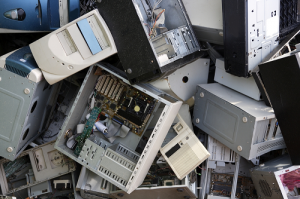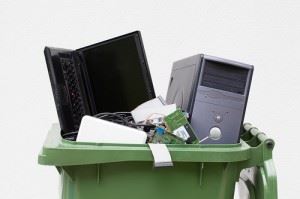The life cycle for electronic products is shrinking at fast rates. Manufacturers are launching new and differentiated electronic products every day to quench the thirst for the products among home-based and business consumers. As soon as new products come out, consumers are swift at throwing away their previous inferior products to switch to their superior versions. The advancement of how tech companies market their products makes them almost irresistible.
While it isn’t a crime to try and break the glass ceilings of how electronic devices can improve society, it is a crime to neglect the disposal of these waste products. The sad truth is that e-waste is the fastest growing waste stream globally. With each electronic product that you throw away, comes an inherent risk of exposing the environment to irreversible damage. The onus is upon you, whether you are a consumer or a manufacturer, to do your part in conserving the environment through proper toxic waste disposal initiatives for these electronics.
Read on to learn how you can help conserve the environment through proper-waste disposal:
Why Dealing with E-Waste Properly Is Essential
1. Toxic Materials
 Some of the materials used for manufacturing electronic products like smartphones and laptops might actually be quite harmful. These devices may contain lead, mercury, chromium, and cadmium. Proper toxic waste disposal processes have to be used to ensure that none of these products are released into the environment.
Some of the materials used for manufacturing electronic products like smartphones and laptops might actually be quite harmful. These devices may contain lead, mercury, chromium, and cadmium. Proper toxic waste disposal processes have to be used to ensure that none of these products are released into the environment.
2. Cyber Security
Most of the devices that you throw away- as an individual or a business- once contained important data. This is the kind of data that cybercriminals yearn for, and they can wreak havoc in your life if they get hold of the data. Sure, you can reset your phone, or wipe out hard drives before throwing these devices out, but the data can be recovered. Ideally, by working with a business that is well versed with handling and recycling electronic waste, you can reduce this risk.
3. Recycling Raw Materials
Modern-day devices are made using precious metals, some of which have to go through a lot of processing to come up with. The metals in the devices are typically of more value than their raw ore counterparts since they are already pure and processed. If thrown away, these materials go to waste. Recycling these products exposes the environment to less pollution while making the process of creating new devices easier.
4. Waste Disposal Is Regulated
Following the current public uproar on environmental conservation and the role people play in controlling climate change, governments have set up ad hoc regulations. Some of these regulations touch on how both businesses and individuals throw away their waste, including toxic waste disposal practices. Ignoring such regulations can land you on the wrong side of the law.
How to Recycle Your Electronic Devices
Your best method for recycling your used electronic devices will depend on where you live and the toxic waste disposal structures in place. Among the best ways to dispose of electronics is to donate the electronics for reuse as is- as long as you wipe out all your personal data from them. Other alternatives include taking the data to authorized electronics recycler locations, retailer take-back programs, or electronic recycling events.
You can also look for certified waste disposal and recycling businesses to help you with your waste. Such companies have toxic waste disposal structures in place to not only conserve the environment but also prevent the misappropriation of your data.
Environmental conservation isn’t a job preserved for one person or company- it has to be a concerted effort among consumers. As you enjoy the latest devices that the tech world has to offer, pay attention to how you throw away old products. Some of these products might still be good enough to be used. Contact a waste disposal business today to contribute to environmental conservation.
 Text Us
Text Us





